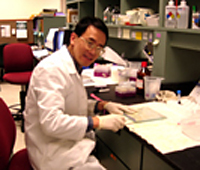
Adjunct Research Assistant Professor Vet & Animal Sciences, University of Massachusetts
Research Scientist, Pioneer Valley Life Sciences Institute
Email: rong.shao@bhs.org
R. Shao PVLSI website
R. Shao Veterinary & Animal Sciences Web Site
Ph.D.: Philadelphia College of Pharmacy
Postdoc: Duke University
Molecular Mechanisms in Breast Cancer Development
Breast cancer is the most life-threatening lesion among women in this country and the incidence of the disease is still gradually increasing every year. Although early diagnosis and treatment of breast cancer have much improved, mortality at the later stage of the cancer remains static. Major stepwise progression of the cancer is attributed to tumor angiogenesis and metastasis. Tumor angiogenesis, the new vasculature formation from pre-existing blood vessels, is a fundamental process required for tumor growth. The angiogenic switch is initially triggered by the ectopic production and elaboration of angiogenic factors mainly from tumor cells including growth factors VEGF and bFGF. Those angiogenic molecules bind to specific membrane tyrosine kinase receptors to induce angiogenic signaling cascades in endothelial cells, a major component of the blood vasculature. The new vasculature developed by endothelial cells in turn facilitates tumor growth and expansion. In addition, the tumor angiogenesis is frequently associated with tumor metastasis, a process that is mainly characterized by tumor cells. Metastatic tumor cells are capable of defying constrains of tissue boundaries and migrating into foreign tissues as a consequence of secondary tumor development.
We are currently interested in the identification of molecules that potentially induce or mediate tumor angiogenesis and tumor metastasis. In addition, we focus on defining their molecular mechanisms underling tumor progression. The information obtained by these investigations will be apparently beneficial to the clinical treatment for cancer patients.
Representative publications:
R. Shao, S. Scully, W. Yan, B. Bentley, J. Mueller, C. Brown, C. Bigelow, and L. Schartz. The novel lupus antigen protein Acheron enhances the development of human breast cancer. Inter. J. Cancer 130: 544-554, 2012
S. Scully, W. Yan, B. Bentley, Q.J. Cao, and R. Shao. Inhibitory activity of YKL-40 in mammary epithelial cell differentiation and polarization induced by lactoenic hormones: a role in mammary tissue involution. PLoS ONE. 6: e25819, 2011.
R. Shao, Q.J. Cao, R.B. Arenas, C. Bigelow, B. Bentley, and W. Yan. Breast cancer expression of YKL-40 correlates with tumor grade, poor differentiation and other cancer markers. Br. J. Cancer 105: 1203-1209, 2011.
R. Francescone, M. Faibish, and R. Shao. A Matrigel-based tube formation assay to assess the vasculogenic activity of tumor cells. J. Vis. Exp. 55: 3040, 2011.
R. Francescone, S. Scully, M. Faibish, S. Taylor, D. Oh, L. Moral, W. Yan, B. Bentley, and R. Shao. The role of YKL-40 in the angiogenisis, radioresistance, and progression of glioblastoma. J.Biol. Chem. 286: 15332-15343, 2011.
M. Faibish, R. Francescone, B. Bentley, W. Yan, and R. Shao. GATA3 inhibits breast cancer metastasis through the reversal of epithelial-mesenchymal transition. J. Biol. Chem. 285: 14042-14051, 2010.
R. Shao, K. Hamel, L. Petersen, J. Cao, R.B. Arenas, C. Bigelow, B. Bentley, and W. Yan. YKL-40, a secreted glycoprotein, promotes tumor angiogenesis. Oncogene 28, 4456-4468, 2009.
P. Apopa, Y. Qian, R. Shao, N. Guo, D. Schwegler-Berry, M. Pacurari, D. Porter, X. Shi, V. Valyathan, V. Castranova, and D. Flynn. Iron oxide nanoparticles induce human microvascular endothelial cell permeability through reactive oxygen species production and microtubule remodeling. Particle Fibre Toxicol. 6: 1-14, 2009.
W. Yan, B. Bentley, and R. Shao. Distinct angiogenic mediators are required for bFGF and VEGF-induced angiogenesis: the role of cytoplasmic tyrosine kinase c-Abl in tumor angiogenesis. Mol. Biol. Cell 19: 2278-2288, 2008.
A. Khimji, R. Shao, and D.C. Rockey. Divergent Transforming Growth Factor-beta Signaling in Hepatic Stellate Cells after Liver Injury. Am. J. Pathol. 173: 716-727, 2008.
W. Yan and R. Shao: Transduction of a mesenchyme-specific gene periostin into 293T cells induces cell invasive activity through epithelial-mesenchymal transformation. J. Biol. Chem. 281: 19700-8, 2006.
R. Shao and X. Guo. Human microvascular endothelial cells immortalized with hTERT: a model for the study of in vitro angiogenesis. Biochem. Biophys Res. Commun. 321, 788-794, 2004.
S. Bao, G. Ouyang, X. Bai, H. Zhi, C. Ma, M. Liu, R. Shao, R. Anderson, J. N. Rich and X-F. Wang. Periostin potently promotes metastatic growth of colon cancer by augmenting cell survival via the Akt/PKB pathway . Cancer Cell 5, 329-339, 2004.
R. Shao, S. Bao, X. Bai, C. Blanchette, R. Anderson, J. R. Mark and X-F. Wang. Acquired expression of periostin by breast cancers promotes tumor progression via enhancement of angiogenesis. Mol. Cell. Biol . 24, 3992-4003, 2004.
R. Shao, Z. Shi, P.J. Gotwals, V.E. Koteliansky and D.C.Rockey. Cell and molecular regulation of endothelin-1 production during hepatic wound healing. Mol. Biol. Cell 14,2327-2341, 2003
C. Hubbert, A. Guardiola, R. Shao, Y. Kawaguchi, A. Ito, A. Nixon, M. Yoshida, X-F. Wang and T-P. Yao. HDAC6 is a microtubule-associated deacetylase. Nature 417 :455-458, 2002.
R. Shao and D.C. Rockey. Effects of endothelins on hepatic stallate cell synthesis of endothelin-1 during hepatic wound healing. J. Cell. Physiol . 191:342-350, 2002.
Q. Yu, R. Shao, H.S. Qian, S.E. George and D.C. Rockey. Gene transfer of the neuronal NO synthase isoform to cirrhotic rat liver ameliorates portal hypertension. J. Clin. Invest . 105:741-748,2000.
R. Shao, W. Yan and D. C. Rockey. Endothelin production is regulated by endothelin converting enzyme-1 in hepatic wound healing. J. Biol. Chem . 274: 3228-3234,1999.